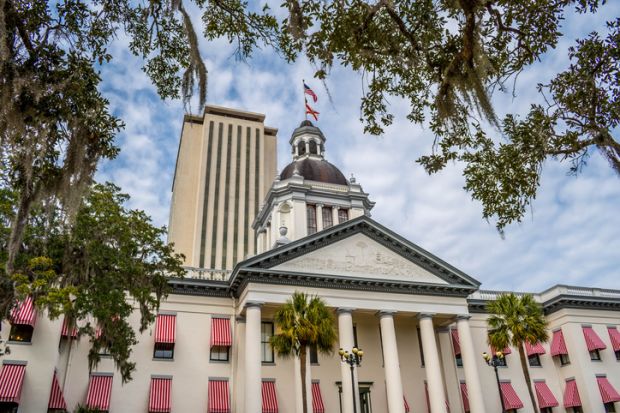The president of Florida A&M University, Larry Robinson, is resigning after nearly seven years leading the top-ranked public historically black institution, amid troubles over poor programme performance and a major fundraising misstep.
Professor Robinson, in a letter to the FAMU campus community, gave no specific reason for his departure from the presidency, although he alluded to the multiple challenges that he had been confronting.
“FAMU can never be judged by one president or one individual’s accomplishments or even one moment of prosperity or challenge,” he told the 9,000-student institution in the state capital Tallahassee.
His resignation comes, however, as the university is investigating the case of a 30-year-old hemp farmer who was given a commencement speech slot and an accompanying award this past semester after gifting the university $237 million (£183 million) in stock that was later suspected to be worth far less.
Professor Robinson also has been enduring criticism from the state board of governors over poor licensure exam pass rates across its major professional programmes, including law, nursing and pharmacy.
The president plans to remain at FAMU as a professor of environmental studies, after taking a one-year sabbatical. His exact departure date was not immediately set, university officials said.
The loss of Professor Robinson is raising some concern that Florida’s governor, Ron DeSantis – an outspoken critic of academic freedom and efforts to promote racial diversity – might use the FAMU opening to further impose that agenda.
The most startling example in that regard was the governor’s appointment of trustees at the liberal arts institution New College of Florida, their replacement of its president with one of Mr DeSantis’ political allies, and the subsequent loss of more than one-third of its faculty.
The governor’s power over institutional leadership positions remains indirect, and he generally had been seen as interfering less at the state’s most prominent campuses. Yet Mr DeSantis also has been reported this year as trying to appoint another political ally to the presidency of Florida Atlantic University, amid a wider set of efforts to make the state’s appointment process in such cases more secretive.
Professor Robinson also arrived during a period of crisis. He was first appointed as FAMU’s interim president in 2012, after a hazing death and amid troubles with accreditation and enrolment. After the appointment and ousting of another leader, Professor Robinson returned to the presidency in 2016.
“He became president at a consequential time for the university, and was the right guy at the right time,” healthcare executive Alan Levine, the vice-chair of the board of governors of the State University System of Florida – the governing body of Florida’s 12 state universities – said of Professor Robinson in a social media posting.
“I am proud of his accomplishments while at FAMU, including unprecedented student success, a top 100 ranking, #1 ranking among public HBCUs and the reduction in student debt,” Mr Levine said.




